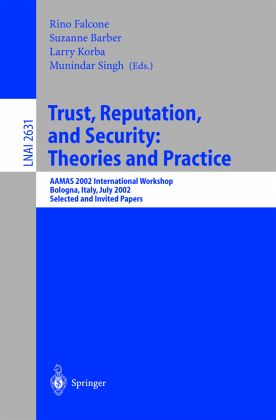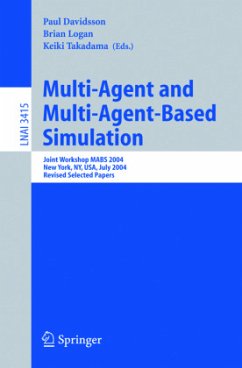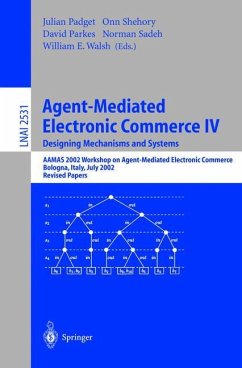
Trust, Reputation, and Security: Theories and Practice
AAMAS 2002 International Workshop, Bologna, Italy, July 15, 2002. Selected and Invited Papers
Herausgegeben: Falcone, Rino; Barber, Suzanne; Korba, Larry; Singh, Munindar

PAYBACK Punkte
20 °P sammeln!
This special issue is the result of the workshop Deception, Fraud and Trust in Agent Societies, held in Bologna on July 15, 2002 as part of the Autonomous Agents and Multi-Agent Systems 2002 Conference (AAMAS2002), organized by Rino Falcone, Suzanne Barber, Larry Korba, and Munindar Singh. The workshop included a special track on Privacy and Protection with Multi-Agent Systems. The aim of the workshop was to bring together researchers from different ?elds (Arti?cial Intelligence, Mul- agent Systems, Cognitive Science, Game Theory, and Social and Organizational S- ences) that could contribute t...
This special issue is the result of the workshop Deception, Fraud and Trust in Agent Societies, held in Bologna on July 15, 2002 as part of the Autonomous Agents and Multi-Agent Systems 2002 Conference (AAMAS2002), organized by Rino Falcone, Suzanne Barber, Larry Korba, and Munindar Singh. The workshop included a special track on Privacy and Protection with Multi-Agent Systems. The aim of the workshop was to bring together researchers from different ?elds (Arti?cial Intelligence, Mul- agent Systems, Cognitive Science, Game Theory, and Social and Organizational S- ences) that could contribute to a better understanding of trust, privacy and protection in agent societies. The workshop scope included theoretical results and their applications inhuman computerinteractionandelectroniccommerce. Thisissueincludesaselection oftherevisedandextendedversionsoftheworkspresentedattheworkshop,incorpor- ing many points that emerged in our discussions, as well as invited papers from expert peopleinthe?eld,whichinourviewgivesacompletecoverageofallrelevantissues. We gratefully acknowledge the ?nacial support from the Italian National Research Council, Institute for Cognitive Science and Technology and theALFEBIITE European Project, contract number IST-1999-10298. We want to express our gratitude to Cristiano Castelfranchi for his stimulating and valuable comments and suggestions both for the organization of the workshop and for the preparation of this special issue.












